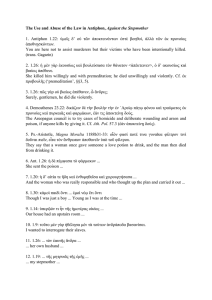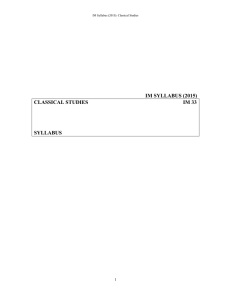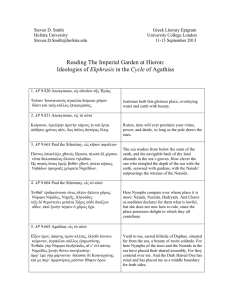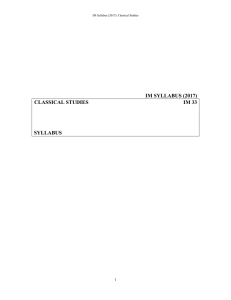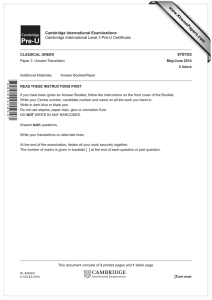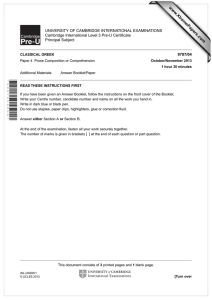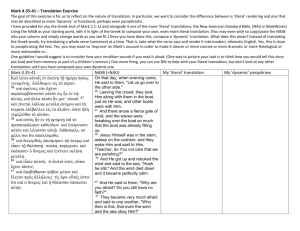IM SYLLABUS (2013)
advertisement
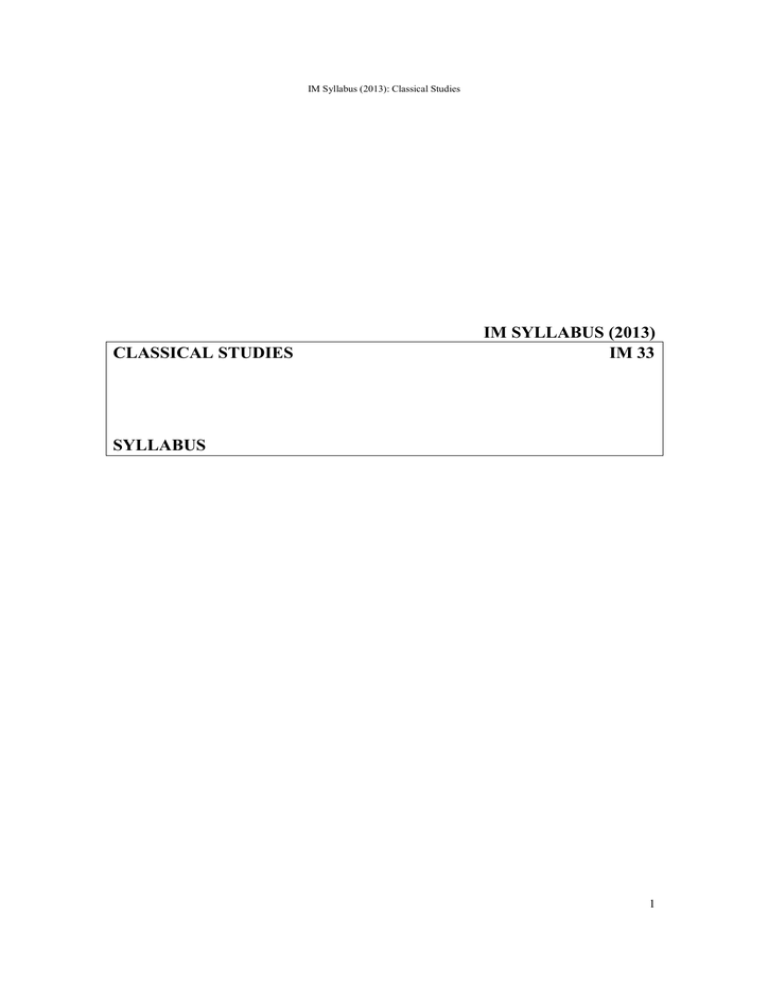
IM Syllabus (2013): Classical Studies CLASSICAL STUDIES IM SYLLABUS (2013) IM 33 SYLLABUS 1 IM Syllabus (2013): Classical Studies Classical Studies IM 33 Syllabus Paper 1 (3hrs) Classical Studies IM Syllabus AIMS To impart an enjoyable and solid body of knowledge on the Classical world, its cultures and its languages to prospective university students. This is a mixture of Latin and Greek grammar with the knowledge of the Classical world and a representative sample of its literature. This course will not reduplicate material covered in the BA Classics (which focuses on the language and literatures of the classical world) course and is not a replica of Classical Culture and Civilisation (a course in English on the history and civilisation of the classical world). Instead this course blends language, literature and cultural/historical studies. By doing this, it will provide a priceless body of knowledge on the classical world which knowledge will provide students with a real asset in many university courses. OBJECTIVES To serve as a propaedeutic course for prospective classics students. To give prospective students of the Faculties of Arts/Theology/Laws fundamental knowledge and skills that will be invaluable for their future studies. To give prospective medical students enough familiarity with the Latin and Greek languages to make learning medical terminology, and therefore their whole course, so much easier. SUBJECT CONTENT The subject will address Latin and Greek grammar, mythology, history, philosophy, drama, art, literature and society. SCHEME OF ASSESSMENT Three (3) hour exam consisting of: • Section A: Five sentences to translate from English into Latin and another five sentences to translate from English into Greek. • Section B: A choice of either a Greek or Latin extract to translate into English. Also includes a few general questions, to be answered in English, strictly related to the immediate content of the chosen gobbet. • Section C: An essay from a selection of topics covering the theoretical elements of the course. CONTENT Latin Grammar Present, future, imperfect Indicative active of the four conjugations Perfect, future perfect, Pluperfect indicative active of the four conjugations 1st & 2nd declension nouns + filius & deus 2 IM Syllabus (2013): Classical Studies Us-a-um/er-a-um adjectives Third declension Adjectives of the 3rd declension Present, future, imperfect Indicative passive of the four conjugations 4th declension; 5th declension Perfect, future perfect, Pluperfect indicative passive of the four conjugations Sum – indicative Comparison of adjectives: Regular -ilis Irregular forms Personal/Reflexive pronouns, Possessive adjectives Demonstratives/Relatives; Ipse & Idem Imperative active & Passive Comparison of adverbs Infinitive; Infinitive as Verbal Noun Participles active & passive Subjunctive Present & Imperfect Active of the 4 conjugations Subjunctive Perfect & Pluperfect Active of the 4 conjugations Syntax of subjunctive Subjunctive of sum Subjunctive passive Utor & Deponents Possum & volo/nolo/malo This syllabus does not comprise: Conjugations of capio, fero, eo, fio & Interrogatives. Greek Grammar Letters; Characters; Signs; Breathings Article; Feminine nouns of 1st declension Principles of recessive & persistent accents Present indicative of λύω Future indicative of λύω Masculine nouns of 1st declension Imperfect indicative of λύω Aorist indicative of λύω 2nd declension nouns Masc/Fem/Neuter. Perfect indicative of λύω Pluperfect indicative of λύω Adjectives of 1st & 2nd declensions, µέγας, πολύς Present and imperfect indicative of εἰµί Future indicative of εἰµί Present active infinitive 3rd declension – Palatal stems 3rd declension labial stems 3 IM Syllabus (2013): Classical Studies Indicative active of palatal verbs; Indicative active of labial verbs 3rd declension Dental stems & 3rd declension λ, ρ, ν, ς, ι, υ Indicative active of Dental verbs Middle/Passive – ω verbs 3rd Declension stems in diphthongs, liquid stems, and the remaining irregular 3rd declension nouns Adjectives of the 3rd declension, 3-1-3, 3-3-3 Active/Middle/Passive infinitives Active Imperatives Present, future, aorist & Perfect active participles of λύω Middle participles of λύω Passive participles of λύω This syllabus does not comprise: Middle/passive Imperatives. Conjugations of – αω, -εω, -οω, Subjunctive, Optative and Athematic (-µι) verbs. Cultural units Mythology Mythology – The Beginning of Things Mythology – The Rise of Zeus and the Olympians Mythology – Heracles Mythology – Crete and Athens – Europa, Minos, Pasiphae, The Minotaur, Ariadne, Theseus. Mythology – Trojan War Mythology – The Pelopids Mythology - Aeneas and the foundation of Rome History History – the Origin of the Greeks, Mycenae, Ionia History – The Persian Wars History – The Athenian Empire and the Peloponnesian Wars History – Alexander, the Conquest of the East and the Hellenic Empires History – Foundation of Rome and the period of the Kings History – The Roman Republic and the Gracchian Revolutions History – Scipio and Hannibal History – Julius Caesar History – Augustus and the Pax Romana General Culture General Culture – Ionian civilisation General Culture – 5th century Athens: Drama & Philosophy General Culture – 5th century Sculpture & Architecture 4 IM Syllabus (2013): Classical Studies General Culture – Roman art and Architecture till the establishment of the principate General Culture – Roman society during the Republic General Culture – supreme on the battlefield: the Phalanx & the Legion Literature Literature – The Epics Literature – Historiography Literature – Philosophy Literature – tragedy, old & new comedy Literature – Rhetoric Gobbets 8 Greek extracts and 8 Latin extracts all of which are very short (ranging from a few verses/sentences to a short paragraph at most) containing some of the most representative examples of Classical literature. Gobbets Section A - Prose Gobbet 1 – Archaeology; Pausanias, 1.32.3 δῆµός ἐστι Μαραθὼν ἴσον τῆς πόλεως τῶν Ἀθηναίων ἀπέχων καὶ Καρύστου τῆς ἐν Εὐβοίᾳ: ταύτῃ τῆς Ἀττικῆς ἔσχον οἱ βάρβαροι καὶ µάχῃ τε ἐκρατήθησαν καί τινας ὡς ἀνήγοντο ἀπώλεσαν τῶν νεῶν. τάφος δὲ ἐν τῷ πεδίῳ Ἀθηναίων ἐστίν, ἐπὶ δὲ αὐτῷ στῆλαι τὰ ὀνόµατα τῶν ἀποθανόντων κατὰ φυλὰς ἑκάστων ἔχουσαι, καὶ ἕτερος Πλαταιεῦσι Βοιωτῶν καὶ δούλοις: ἐµαχέσαντο γὰρ καὶ δοῦλοι τότε πρῶτον. There is a deme called Marathon, equally distant from Athens and Carystus in Euboea. It was at this point in Attica that the foreigners landed, were defeated in battle, and lost some of their vessels as they were putting off from the land. On the plain is the grave of the Athenians, and upon it are slabs giving the names of the killed according to their tribes; and there is another grave for the Boeotian Plataeans and for the slaves, for slaves fought then for the first time by the side of their masters. Background preparation: The Battle of Marathon (any history book). Gobbet 2 – Archaeology; Pliny, Epistulae: 6.16.5-6 Nubes - incertum procul intuentibus ex quo monte; Vesuvium fuisse postea cognitum est - oriebatur, cuius similitudinem et formam non alia magis arbor quam pinus expresserit. Nam longissimo velut trunco elata in altum quibusdam ramis diffundebatur, credo quia recenti spiritu evecta, dein senescente eo destituta aut etiam pondere suo victa in latitudinem vanescebat, candida interdum, interdum sordida et maculosa prout terram cineremve sustulerat. 5 IM Syllabus (2013): Classical Studies The cloud was rising - it was not clear to the onlookers at that distance from which mountain; it was afterwards known to be Vesuvius - whose similarity and shape may be expressed as being not more like another tree than like a pine for it rose to a great height on a sort of trunk and then split off into certain branches, I think because it was thrust upwards by the first blast and then left unsupported as the pressure subsided, or else it dispersed into the distance, having been overcome by its own weight. Sometimes it looked white, sometimes blotched and dirty, according to the amount of soil and ashes it carried with it. Background preparation: The explosion of Vesuvius and the burial of Pompeii (any history book). Gobbet 3 – History; Xenophon, Anabasis: Book I, Chapter 8, 17-19 καὶ οὐκέτι τρία ἢ τέτταρα στάδια διειχέτην τὼ φάλαγγε ἀπ᾽ ἀλλήλων ἡνίκα ἐπαιάνιζόν τε οἱ Ἕλληνες καὶ ἤρχοντο ἀντίοι ἰέναι τοῖς πολεµίοις. ὡς δὲ πορευοµένων ἐξεκύµαινέ τι τῆς φάλαγγος, τὸ ὑπολειπόµενον ἤρξατο δρόµῳ θεῖν: καὶ ἅµα ἐφθέγξαντο πάντες οἷον τῷ Ἐνυαλίῳ ἐλελίζουσι, καὶ πάντες δὲ ἔθεον. λέγουσι δέ τινες ὡς καὶ ταῖς ἀσπίσι πρὸς τὰ δόρατα ἐδούπησαν φόβον ποιοῦντες τοῖς ἵπποις. πρὶν δὲ τόξευµα ἐξικνεῖσθαι ἐκκλίνουσιν οἱ βάρβαροι καὶ φεύγουσι. καὶ ἐνταῦθα δὴ ἐδίωκον µὲν κατὰ κράτος οἱ Ἕλληνες, ἐβόων δὲ ἀλλήλοις µὴ θεῖν δρόµῳ, ἀλλ᾽ ἐν τάξει ἕπεσθαι. At length the opposing lines were not three or four stadia apart, and then the Greeks struck up the paean and began to advance against the enemy. And when, as they proceeded, a part of the phalanx billowed out, those who were thus left behind began to run; at the same moment they all set up the sort of war-cry which they raise to Enyalius, and all alike began running. It is also reported that some of them clashed their shields against their spears, thereby frightening the enemy's horses. And before an arrow reached them, the barbarians broke and fled. Thereupon the Greeks pursued with all their might, but shouted meanwhile to one another not to run at a headlong pace, but to keep their ranks in the pursuit. Background preparation: Xenophon, Anabasis, Book 1, Chapter 8 Gobbet 4 – History; Caesar, De Bello Gallico: Book VII, Chapter 88, 1-3 Eius adventu ex colore vestitus cognito, quo insigni in proeliis uti consuerat, turmisque equitum et cohortibus visis quas se sequi iusserat, ut de locis superioribus haec declivia et devexa cernebantur, hostes proelium committunt. Vtrimque clamore sublato excipit rursus ex vallo atque omnibus munitionibus clamor. Nostri omissis pilis gladiis rem gerunt. Repente post tergum equitatus cernitur; cohortes aliae appropinquant. Hostes terga vertunt; fugientibus equites occurrunt. Fit magna caedes His arrival being known from the color of his robe, and the troops of cavalry, and the cohorts which he had ordered to follow him being seen, as these low and sloping grounds were plainly visible from the eminences, the enemy join battle. A shout being raised by 6 IM Syllabus (2013): Classical Studies both sides, it was succeeded by a general shout along the ramparts and whole line of fortifications. Our troops, laying aside their javelins, carry on the engagement with their swords. The cavalry is suddenly seen in the rear of the Gauls; the other cohorts advance rapidly; the enemy turn their backs; the cavalry intercept them in their flight, and a great slaughter ensues. Background preparation: Caesar, De Bello Gallico, Book VII. Gobbet 5 – Philosophy; Plato, Phaedo: 118a καὶ αὐτὸς ἥπτετο καὶ εἶπεν ὅτι, ἐπειδὰν πρὸς τῇ καρδίᾳ γένηται αὐτῷ, τότε οἰχήσεται. ἤδη οὖν σχεδόν τι αὐτοῦ ἦν τὰ περὶ τὸ ἦτρον ψυχόµενα, καὶ ἐκκαλυψάµενος—ἐνεκεκάλυπτο γάρ—εἶπεν—ὃ δὴ τελευταῖον ἐφθέγξατο—“ὦ Κρίτων, ἔφη, τῷ Ἀσκληπιῷ ὀφείλοµεν ἀλεκτρυόνα: ἀλλὰ ἀπόδοτε καὶ µὴ ἀµελήσητε.” ἀλλὰ ταῦτα, ἔφη, ἔσται, ὁ Κρίτων: ἀλλ᾽ ὅρα εἴ τι ἄλλο λέγεις. ταῦτα ἐροµένου αὐτοῦ οὐδὲν ἔτι ἀπεκρίνατο, ἀλλ᾽ ὀλίγον χρόνον διαλιπὼν ἐκινήθη τε καὶ ὁ ἄνθρωπος ἐξεκάλυψεν αὐτόν, καὶ ὃς τὰ ὄµµατα ἔστησεν: ἰδὼν δὲ ὁ Κρίτων συνέλαβε τὸ στόµα καὶ τοὺς ὀφθαλµούς. And again he touched him and said that when it reached his heart, he would be gone. The chill had now reached the region about the groin, and uncovering his face, which had been covered, he said--and these were his last words--“Crito, we owe a cock to Aesculapius. Pay it and do not neglect it.” “That,” said Crito, “shall be done; but see if you have anything else to say.” To this question he made no reply, but after a little while he moved; the attendant uncovered him; his eyes were fixed. And Crito when he saw it, closed his mouth and eyes. Background preparation: Plato, Phaedo. Gobbet 6 – Philosophy; John’s Gospel, 1:1-5 Ἐν ἀρχῇ ἦν ὁ λόγος, καὶ ὁ λόγος ἦν πρὸς τὸν θεόν, καὶ θεὸς ἦν ὁ λόγος. Οὗτος ἦν ἐν ἀρχῇ πρὸς τὸν θεόν. πάντα δι᾽ αὐτοῦ ἐγένετο, καὶ χωρὶς αὐτοῦ ἐγένετο οὐδὲ ἕν. ὃ γέγονεν ἐν αὐτῷ ζωὴ ἦν, καὶ ἡ ζωὴ ἦν τὸ φῶς τῶν ἀνθρώπων: καὶ τὸ φῶς ἐν τῇ σκοτίᾳ φαίνει, καὶ ἡ σκοτία αὐτὸ οὐ κατέλαβεν. In the beginning was the Word, and the Word was with God, and the Word was God. The same was in the beginning with God. All things were made through him. Without him was not anything made that has been made. In him was life, and the life was the light of men. The light shines in the darkness, and the darkness did not overcome it. Background preparation: John’s Gospel, Book 1. Gobbet 7 – Oratory; Thucydides, The History of the Peloponnesian War: Book II, chapter 41, verses 1-3 ξυνελών τε λέγω τήν τε πᾶσαν πόλιν τῆς Ἑλλάδος παίδευσιν εἶναι καὶ καθ᾽ ἕκαστον δοκεῖν ἄν µοι τὸν αὐτὸν ἄνδρα παρ᾽ ἡµῶν ἐπὶ πλεῖστ᾽ ἂν εἴδη καὶ µετὰ χαρίτων µάλιστ᾽ ἂν εὐτραπέλως τὸ σῶµα αὔταρκες παρέχεσθαι. καὶ ὡς οὐ λόγων ἐν τῷ παρόντι κόµπος τάδε µᾶλλον ἢ ἔργων ἐστὶν ἀλήθεια, αὐτὴ ἡ δύναµις τῆς 7 IM Syllabus (2013): Classical Studies πόλεως, ἣν ἀπὸ τῶνδε τῶν τρόπων ἐκτησάµεθα, σηµαίνει. µόνη γὰρ τῶν νῦν ἀκοῆς κρείσσων ἐς πεῖραν ἔρχεται, καὶ µόνη οὔτε τῷ πολεµίῳ ἐπελθόντι ἀγανάκτησιν ἔχει ὑφ᾽ οἵων κακοπαθεῖ οὔτε τῷ ὑπηκόῳ κατάµεµψιν ὡς οὐχ ὑπ᾽ ἀξίων ἄρχεται. In short, I say that as a city we are the school of Hellas; while I doubt if the world can produce a man, who where he has only himself to depend upon, is equal to so many emergencies, and graced by so happy a versatility as the Athenian. And that this is no mere boast thrown out for the occasion, but plain matter of fact, the power of the state acquired by these habits proves. For alone of her contemporaries is found when tested to be greater than her reputation, and alone gives no occasion to her assailants to blush at the antagonist by whom they have been worsted, or to her subjects to question her title by merit to rule. Background preparation: Thucydides, The History of the Peloponnesian War, Book II, chapters 35-45. Gobbet 8 – Oratory; Cicero, In Verrem: Book 2, IV, 103 Insula est Melita, iudices, satis lato a Sicilia mari periculosoque diiuncta; in qua est eodem nomine oppidum, quo iste numquam accessit, quod tamen isti textrinum per triennium ad muliebrem vestem conficiendam fuit. ab eo oppido non longe in promunturio fanum est Iunonis antiquum, quod tanta religione semper fuit ut non modo illis Punicis bellis quae in his fere locis navali copia gesta atque versata sunt, sed etiam hac praedonum multitudine semper inviolatum sanctumque fuerit. There is an island called Melita, O judges, separated from Sicily by a sufficiently wide and perilous navigation, in which there is a town of the same name, to which Verres never went, though it was for three years a manufactory to him for weaving women's garments. Not far from that town, on a promontory, is an ancient temple of Juno, which was always considered so holy, that it was not only always kept inviolate and sacred in those Punic wars, which in those regions were carried on almost wholly by the naval forces, but even by the bands of pirates which ravage those seas. Background preparation: Harris Robert, Imperium, London 2006, Part 1 (pp. 3-240). Section B - Poetry Gobbet 9 – Epic; Homer, Iliad: Book 1:1-5 µῆνιν ἄειδε θεὰ Πηληϊάδεω Ἀχιλῆος οὐλοµένην, ἣ µυρί᾽ Ἀχαιοῖς ἄλγε᾽ ἔθηκε, πολλὰς δ᾽ ἰφθίµους ψυχὰς Ἄϊδι προΐαψεν ἡρώων, αὐτοὺς δὲ ἑλώρια τεῦχε κύνεσσιν οἰωνοῖσί τε πᾶσι, ∆ιὸς δ᾽ ἐτελείετο βουλή. The wrath sing, goddess, of Peleus' son, Achilles, that destructive wrath which brought countless woes upon the Achaeans, and sent forth to Hades many valiant souls of heroes, 8 IM Syllabus (2013): Classical Studies and made them themselves spoil for dogs and every bird; thus the plan of Zeus came to fulfillment Background preparation: Homer, Iliad, Book 1. Gobbet 10 – Epic; Vergil, Aeneid: Book 1:1-7 Arma virumque cano, Troiae qui primus ab oris Italiam, fato profugus, Laviniaque venit litora, multum ille et terris iactatus et alto vi superum saevae memorem Iunonis ob iram; multa quoque et bello passus, dum conderet urbem, inferretque deos Latio, genus unde Latinum, Albanique patres, atque altae moenia Romae. I sing of arms and the man, he who, exiled by fate, first came from the coast of Troy to Italy, and to Lavinian shores – hurled about endlessly by land and sea, by the will of the gods, by cruel Juno’s remorseless anger, long suffering also in war, until he founded a city and brought his gods to Latium: from that the Latin people came, the lords of Alba Longa, the walls of noble Rome. Background preparation: Vergil, Aeneid: Book 1. Gobbet 11 – Comedy; Plautus, Mostellaria: Act 1, Scene 3, 203-215 SCAPHA: Inscita ecastor tu quidem es. PHILEMATIUM: Quapropter? SCAPHA: Quae istuc <cures>, ut te ille amet. PHILEMATIUM: Cur obsecro non curem? SCAPHA: Libera es iam. tu iam quod quaerebas habes: ille té nisi amabit ultro, id pro tuo capite quod dedit perdiderit tantum argenti. PHILOLACHES: Perii hercle, ni ego illam pessumis exemplis enicasso. illa hanc corrumpit mulierem malesuada vitilena. SCAPHA: On my word you really are silly. PHILEMATIUM: For what reason? SCAPHA: Because you care for this, whether he loves you. PHILEMATIUM: Prithee, why should I not care for it? SCAPHA: You now are free. You've now got what you wanted; if he didn't still love you, as much money as he gave for your liberty, he'd lose. PHILOLACHES: (apart). Heavens, I'm a dead man if I don't torture her to death after the most shocking fashion. That evil-persuading enticer to vice is corrupting this damsel. Background preparation: Plautus, Mostellaria. Gobbet 12 – Comedy; Aristophanes, Peace: 182-193 9 IM Syllabus (2013): Classical Studies Ἑρµῆς: ὦ βδελυρὲ καὶ τολµηρὲ κἀναίσχυντε σὺ καὶ µιαρὲ καὶ παµµίαρε καὶ µιαρώτατε, πῶς δεῦρ᾽ ἀνῆλθες ὦ µιαρῶν µιαρώτατε;τί σοί ποτ᾽ ἔστ᾽ ὄνοµ᾽; οὐκ ἐρεῖς; Τρυγαῖος: µιαρώτατος. Ἑρµῆς: ποδαπὸς τὸ γένος δ᾽ εἶ; φράζε µοι. Τρυγαῖος: µιαρώτατος. Ἑρµῆς: πατὴρ δέ σοι τίς ἐστ᾽; Τρυγαῖος: ἐµοί; µιαρώτατος. Ἑρµῆς: οὔτοι µὰ τὴν γῆν ἔσθ᾽ ὅπως οὐκ ἀποθανεῖ,εἰ µὴ κατερεῖς µοι τοὔνοµ᾽ ὅ τι ποτ᾽ ἔστι σοι. Τρυγαῖος: Τρυγαῖος Ἀθµονεύς, ἀµπελουργὸς δεξιός, οὐ συκοφάντης οὐδ᾽ ἐραστὴς πραγµάτων. Ἑρµῆς: ἥκεις δὲ κατὰ τί; Τρυγαῖος: τὰ κρέα ταυτί σοι φέρων. Ἑρµῆς: ὦ δειλακρίων πῶς ἦλθες; Hermes: Oh! impudent, shameless rascal! oh! scoundrel! triple scoundrel! the greatest scoundrel in the world! how did you come here? Oh! scoundrel of all scoundrels! your name? Reply. Trygaeus: Triple scoundrel. Hermes: Your country? Trygaeus: Triple scoundrel. Hermes: Your father? Trygaeus: My father? Triple scoundrel. Hermes: By the Earth, you shall die, unless you tell me your name. Trygaeus: I am Trygaeus of the Athmonian deme, a good vine-dresser, little addicted to quibbling and not at all an informer. Hermes: Why do you come? Trygaeus: I come to bring you this meat. Hermes: (Changing his tone.) Ah! my good friend, did you have a good journey? Background preparation: Aristophanes, Peace. Gobbet 13 – Tragedy; Seneca the Younger, Phaedra: 978-989 Chorus: Res humanas ordine nullo Fortuna regit sparsitque manu munera caeca peiora fouens: uincit sanctos dira libido, fraus sublimi regnat in aula; tradere turpi fasces populus gaudet, eosdem colit atque odit. tristis uirtus peruersa tulit praemia recti: castos sequitur mala paupertas uitioque potens regnat adulter-o uane pudor falsumque decus! 980 985 10 IM Syllabus (2013): Classical Studies Chorus: Fate without order rules the affairs of men, scatters her gifts with unseeing hand, fostering the worse; dire lust prevails against pure men, and crime sits regnant in the lofty palace. The rabble rejoice to give government to the vile, paying high honours even where they hate. Warped are the rewards of uprightness sad virtue gains; wretched poverty dogs the pure, and the adulterer, strong in wickedness, reigns supreme. O decency, honour, how empty and how false! Background preparation: Seneca the Younger, Phaedra. Gobbet 14 – Tragedy; Sophocles, Oedipus Tyrannus: 455-460 Τειρεσίας: φανήσεται δὲ παισὶ τοῖς αὑτοῦ ξυνὼν ἀδελφὸς αὑτὸς καὶ πατήρ, κἀξ ἧς ἔφυ γυναικὸς υἱὸς καὶ πόσις, καὶ τοῦ πατρὸς ὁµόσπορός τε καὶ φονεύς. Teiresias: And he will be discovered to be at once brother and father of the children with whom he consorts; son and husband of the woman who bore him; heir to his father's bed, shedder of his father's blood. Background preparation: Sophocles, Oedipus Tyrannus Gobbet 15 – Lyric; Sappho, Fragment 5 ... Ἔλθε Κύπρι χρυσίαισιν ἐν κυλίκεσσιν ἄβρως συµµεµιγµένον θαλίαισι νέκταρ οἰνοχοεῦσα. Come, goddess of Cyprus, and in golden cups serve nectar delicately mixed with delights. Background preparation: Article on Sappho in a good Classical Encyclopaedia or biographical dictionary. Gobbet 16 – Elegy; Ovid, Heroides: Book X, verses 143-150 Ariadne: si non ego causa salutis, Non tamen est, cur sis tu mihi causa necis. Has tibi plangendo lugubria pectora lassas Infelix tendo trans freta lata manus; Hos tibi — qui superant — ostendo maesta capillos! Per lacrimas oro, quas tua facta movent — Flecte ratem, Theseu, versoque relabere velo! Si prius occidero, tu tamen ossa feres! Ariadne: If I’m not the cause of your health, that’s still no reason why you should cause me harm. These hands weary of beating my sad breast for you, unhappily I stretch them out over the wide waters: I mournfully display to you what remains of my hair: I beg you by these tears your actions have caused: turn your ship, Theseus, fall back against the wind: if I die first, you can still bear my bones. 11 IM Syllabus (2013): Classical Studies Background preparation: Ovid, Heroides, Book X. BIBLIOGRAPHY Textbooks Latin Grammar Kennedy Benjamin Hall, Kennedy’s Revised Latin Primer, London 1965. ISBN 10: 0582362407 Greek Grammar Abbott Evelyn & Mansfield E. D., A Primer of Greek Grammar, London 1997. ISBN 10: 0715612581 Culture Lane Fox Robin, The Classical World: An Epic History From Homer to Hadrian, New York 2008. ISBN 10: 0465024971 Further reading Latin Grammar Morwood James, Latin Grammar, Oxford 1999. Kennedy Benjamin Hall, Kennedy’s Revised Latin Primer, London 1965. Hillard & Botting, Elementary Latin Exercises, London 2001. Greek Grammar Morwood James, Oxford Grammar of Classical Greek, Oxford 2001. Abbott Evelyn & Mansfield E. D., A Primer of Greek Grammar, London 1997. Hillard & Botting, Elementary Greek Exercises, London 2003. Mythology Hard Robin, The Routledge Handbook of Greek Mythology, London 2008. History Barrow R. H., The Romans, London 1965. Bury J.B. & Meiggs Russell, A History of Greece, London 1960. Cary M. & Scullard H. H., A History of Rome Down to the Age of Constantine, London 1980. Kitto H., The Greeks, London 1991. General Culture Bury J.B. & Meiggs Russell, A History of Greece, London 1960. Cary M. & Scullard H. H., A History of Rome Down to the Age of Constantine, London 1980. Goldsworthy Adrian, Roman Warfare, New York 2007. Hanson V. Davis, The Western Way of War: Infantry Battle in Classical Greece, London 1989. Henig Martin (ed.), A Handbook of Roman Art, London 2006. 12 IM Syllabus (2013): Classical Studies Kershaw Stephen, A Brief Guide to Classical Civilization, London 2010. Lane Fox Robin, The Classical World: An Epic History From Homer to Hadrian, New York 2008. Richter Gisela M. A., A Handbook of Greek Art, London 2006. Russell Bertrand, History of Western Philosophy, London 2006. Literature Rose, H. J., A Handbook of Greek Literature From Homer to the Age of Lucian, Wauconda 1996. Rose, H. J., A Handbook of Latin Literature, New York 1999. Web Sites containing literary texts (In English, Latin & Greek): Thesaurus Linguae Graecae: http://www.tlg.uci.edu/ Perseus Project: http://www.perseus.tufts.edu Theoi: http://www.theoi.com/ The Latin Library: http://www.thelatinlibrary.com 13
